Background
Rowan Ricardo Phillips was born in New York City, New York, United States.

2011
Rowan Ricardo Phillips in 2011.
2014
37th & O Streets NW, Washington, DC 20007, United States
Rowan Ricardo Phillips at Lannan Center for Poetics and Social Practice at Georgetown University in September 2014.
2015
Rowan Ricardo Phillips in Lillian Vernon Creative Writers House in 2015.
2015
Rowan Ricardo Phillips in Lillian Vernon Creative Writers House in 2015.
2017
Rowan Ricardo Phillips with Grace Schulman at 2017 Spring Revel. Photo by Matteo Mobilio.
2017
1250 Amherst St, Buffalo, NY 14216, United States
Rowan Ricardo Phillips in Nickols School in 2017.
2019
2100 Flagler Ave, Key West, FL 33040, United States
Rowan Ricardo Phillips in Key West High School on January 11, 2019. Photo by Carly Neilson.
2019
Rowan Ricardo Phillips at the ceremony of 2019 PEN/ESPN Award for Literary Sports Writing.
2020
Rowan Ricardo Phillips at Farrar, Straus and Giroux in 2020.
2020
Rowan Ricardo Phillips with Gregory Pardlo at Farrar, Straus and Giroux in 2020.
2020
Rowan Ricardo Phillips with Neil Roberts in 2020.
500 College Ave, Swarthmore, PA 19081, United States
Swarthmore College where Rowan Ricardo Phillips received his Bachelor of Arts degree.
Brown University, Providence, RI 02912, United States
Brown University where Rowan Ricardo Phillips received his Doctor of Philosophy degree.
Rowan Ricardo Phillips
Rowan Ricardo Phillips
72 5th Ave, New York, NY 10011, United States
Rowan Ricardo Phillips at The New School.
Rowan Ricardo Phillips
Rowan Ricardo Phillips with Ernest Hilbert.
117 E 19th St, New York, NY 10003, United States
Rowan Ricardo Phillips at House of Speakeasy.
Rowan Ricardo Phillips. Photo by Beowulf Sheehan.
Rowan Ricardo Phillips
Rowan Ricardo Phillips
Rowan Ricardo Phillips


















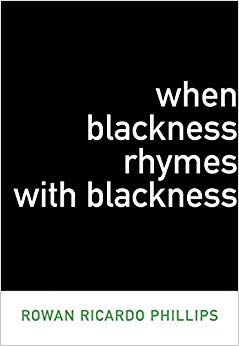
(In When Blackness Rhymes with Blackness, Rowan Ricardo Ph...)
In When Blackness Rhymes with Blackness, Rowan Ricardo Phillips pushes African American poetry to its limits by unraveling "our desire to think of African American poetry as African American poetry." Phillips reads African American poetry as inherently allegorical and thus "a successful shorthand for the survival of poetry but unsuccessful shorthand for the sustenance of its poems." Arguing in favor of the "counterintuitive imagination," Phillips demonstrates how these poems tend to refuse their logical insertion into a larger vision and instead dwell indefinitely at the crux between poetry and race, "where, when blackness rhymes with blackness, it is left for us to determine whether this juxtaposition contains a vital difference or is just mere repetition."
https://www.amazon.com/gp/product/1564785831/ref=dbs_a_def_rwt_bibl_vppi_i5
2010
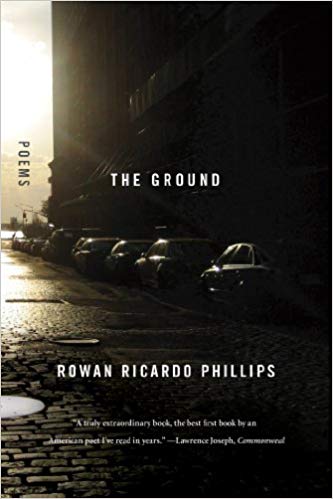
(A work of rare beauty and grace, The Ground is an entire ...)
A work of rare beauty and grace, The Ground is an entire world, drawn and revealed through contemplation of the post-9/11 landscape. With musicality and precision of thought, Phillips's poems limn the troubadour's journey in an increasingly surreal modern world. The origin of mankind, the origin of the self, the self's development in the sensuous world, and - in both a literal and a figurative sense - the end of all things sing through Phillips's supple and idiosyncratic poems. The poet's subtle formal sophistication - somewhere between flair and restraint - and sense of lyric possibility bring together the hard glint of the contemporary world and the eroded permanence of the archaic one through remixes, underground sessions, Spenserian stanzas, myths, and revamped translations. These are poems of fiery intelligence, inescapable music, and metaphysical splendor that concern themselves with lived life and the life of the imagination - both equally vivid and true - as they lay the framework for Phillips's meditations on our connection to and estrangement from the natural world.
https://www.amazon.com/gp/product/0374533849/ref=dbs_a_def_rwt_bibl_vppi_i1
2012
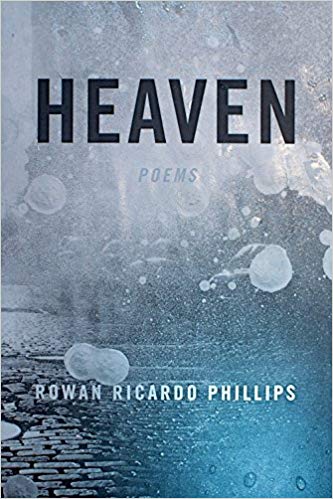
("Who the hell's heaven is this?" Rowan Ricardo Phillips o...)
"Who the hell's heaven is this?" Rowan Ricardo Phillips offers many answers, and none at all, in Heaven, the piercing and revelatory encore to his award-winning debut, The Ground. Swerving elegantly from humor to heartbreak, from Colorado to Florida, from Dante's Paradise to Homer's Iliad, from knowledge to ignorance to awe, Phillips turns his gaze upward and outward, probing and upending notions of the beyond.
https://www.amazon.com/gp/product/0374536228/ref=dbs_a_def_rwt_bibl_vppi_i3
2015
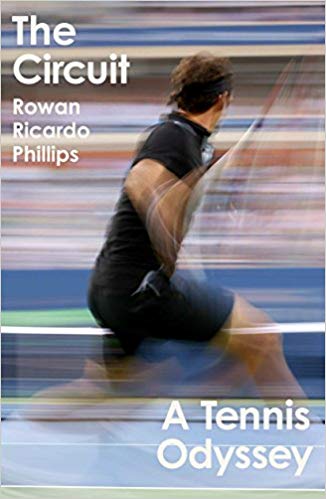
(In The Circuit: A Tennis Odyssey, Rowan Ricardo Phillips ...)
In The Circuit: A Tennis Odyssey, Rowan Ricardo Phillips chronicles 2017 as seen through the unique prism of its pivotal, revelatory, and historic tennis season. The annual tennis schedule is a rarity in professional sports in that it encapsulates the calendar year. And like the year, it’s divided into four seasons, each marked by a final tournament: the Grand Slams. Phillips charts the year from winter’s Australian Open, where Roger Federer and Rafael Nadal renewed their rivalry in a match for the ages, to fall’s United States Open. Along the way, Phillips paints a new, vibrant portrait of tennis, one that captures not only the emotions, nerves, and ruthless tactics of the point-by-point game but also the quicksilver movement of victory and defeat on the tour, placing that sense of upheaval within a broader cultural and social context. Tennis has long been thought of as an escapist spectacle: a bucolic, separate bauble of life.
https://www.amazon.com/gp/product/0374123772/ref=dbs_a_def_rwt_bibl_vppi_i2
2018
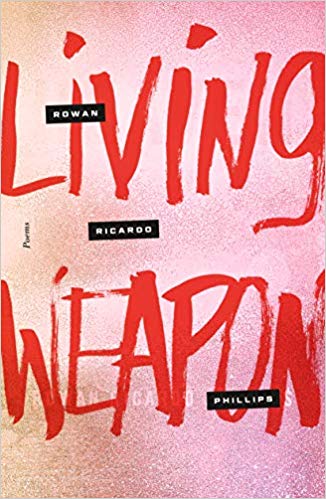
(A revelation, a shoring up, a transposition: Rowan Ricard...)
A revelation, a shoring up, a transposition: Rowan Ricardo Phillips’s Living Weapon is a love song to the imagination, a new blade of light honed in on our political moment. A winged man plummets from the troposphere; four NYPD officers enter a cellphone store; concrete sidewalks hang overhead. Here, in his third collection of poems, Phillips offers us ruminations on violins and violence, on hatred, on turning forty-three, even on the end of existence itself. Living Weapon reveals to us the limitations of our vocabulary, that our platitudes are not enough for the brutal times in which we find ourselves. But still, our lives go on, and these are poems of survival as much as they are an indictment.
https://www.amazon.com/gp/product/0374191999/ref=dbs_a_def_rwt_bibl_vppi_i0
2020
Rowan Ricardo Phillips was born in New York City, New York, United States.
Rowan Ricardo Phillips studied at Swarthmore College where he received a Bachelor of Arts degree. Then he went to Brown University where he obtained a Doctor of Philosophy degree in 2003.
Rowan Ricardo Phillips is known as a poet, critic as well as a translator. His first work is the critical volume When Blackness Rhymes with Blackness (2010). In 2012, he published a collection of poetry The Ground. A poignant and terse vision of New York City unfolds in this book. That same year he translated from the Catalan Salvador Espriu’s story collection Ariadne in the Grotesque Labyrinth. His second collection of poetry is Heaven (2015). Heaven brims with 38 poems that ask "Who the hell’s Heaven is this?" and then splinters the answers into a night sky’s worth of possibilities. Phillips' recent book is Living Weapon (2020). In his new collection, he explores social ills while celebrating poetry’s ability to provide solace and sense during times of upheaval. The poems from this book are lyrical, imaginative, and steeped in a keen understanding of current events.
In addition to his work in the field of poetry, he is a contributing writer for Artforum Magazine. His poems appeared in The New Republic, The New Yorker, Granta, The Paris Review, and Poetry among other publications. The work engages the acts of post-9/11 memory and ruin, lingering in interrupted or merged landscapes of art, rhetoric, and marginalia. A prodigious sportswriter, Phillips wrote on soccer, basketball, and tennis for The New York Times, The New Yorker, The New Republic, and The Paris Review. In 2018 he published his sportsbook The Circuit: A Tennis Odyssey, an energetic, lyrical, the genre-defying account of the 2017 tennis season.
Rowan Ricardo Phillips is also known as an educator. He is a professor of English at Stony Brook University where he served as director of the Poetry Center. He previously taught at Princeton University, Baruch College, Harvard University, Warren Wilson College, and Columbia University.
Rowan Ricardo Phillips is an award-winning recognized author as well as an outstanding educator. He is the winner of 2019 PEN/ESPN Award for Literary Sports Writing for the book The Circuit: A Tennis Odyssey, 2019 Nicolás Guillén Outstanding Book Award for Heaven, 2016 Anisfield-Wolf Book Award for Heaven, 2013 Whiting Award, 2013 PEN/Joyce Osterweil Award for Poetry, and 2013 Great Lakes Colleges Association New Writers Award.
He was a finalist for the National Book Award, Griffin Poetry Prize, the Los Angeles Times Book Prize for Poetry, the NAACP Image Award for Poetry, and the PEN Open Book Award. His work was featured in Best American Poetry 2016 and Best American Poetry 2017 and was translated into Catalan, German, Italian, Norwegian and Spanish.
Phillips is also the recipient of a Guggenheim Fellowship. He was also named the W. Ford Schumann Distinguished Visiting Professor in Democratic Studies at Williams College.
(In When Blackness Rhymes with Blackness, Rowan Ricardo Ph...)
2010("Who the hell's heaven is this?" Rowan Ricardo Phillips o...)
2015(A revelation, a shoring up, a transposition: Rowan Ricard...)
2020(In The Circuit: A Tennis Odyssey, Rowan Ricardo Phillips ...)
2018(A work of rare beauty and grace, The Ground is an entire ...)
2012
Quotations:
"The sign on the door of my life hasn’t said, Writer. And yet I write. I’ve always written. But that’s because I’ve always read."
"Poets, especially, as they’re in search of a sustainable way of creating with their language, absolutely must find a way of unraveling the world and making it again. Heraclitus, I believe, said that geography is fate. That, then, is what tethers us to the world. The rest is pulling on that tether."
"A poem is an object in a world of objects. Remembering this leads to remembering that every poem has a form and every poetic form has a history. These histories tend to lead to a breakdown in the form back to a nascent state and inaugural intention as art. This should humble encomium."
"Form is an invisible map. It leads you from poet to poet, century to century, country to country, language to language, culture to culture. At its most inspired, form traces our inspirations, reverences, and innovations; it’s a palimpsest of song and dance. But at its worst, it’s a pyrrhic prize: form as value and for its own sake."
"My sense of poetry, as an object and in a formal sense, is that if you push it and it doesn’t like what you’re up to it will push you back."
"The nuts and bolts of writing a good poem comes, I believe, from understanding how the spirit of free verse should live in a well-crafted formal verse and how the spirit of meter and form should braid a well-crafted vers libre. Everything else seems like talking around writing the best poetry possible."
"I’ve always been drawn to the poetry of poets who write strong criticism. Poets invested in critique, its history, methods, and applications, poets who think through the world critically (which still meant, for them, with feeling: feeling the sensations of thoughts through powerful critique)."
"Both poems and criticism stoke the same inner fires in me and likewise crawl out of that same fire."
Rowan Ricardo Phillips is entirely agnostic, to both formal and free fundamentalism. Neither makes much sense to him.
Rowan Ricardo Phillips is married and has two daughters.
